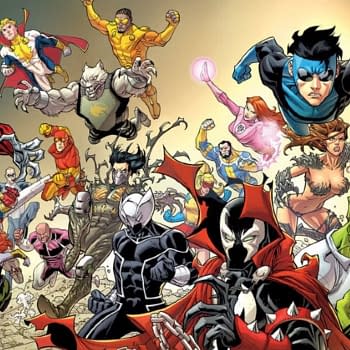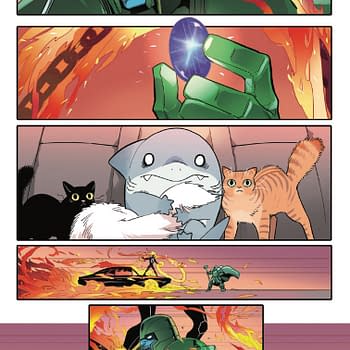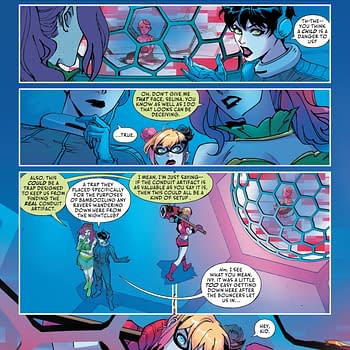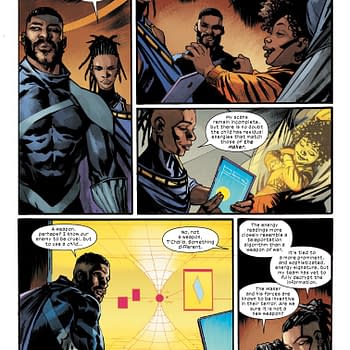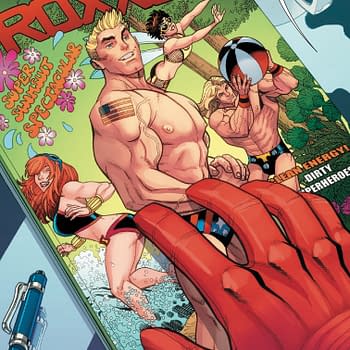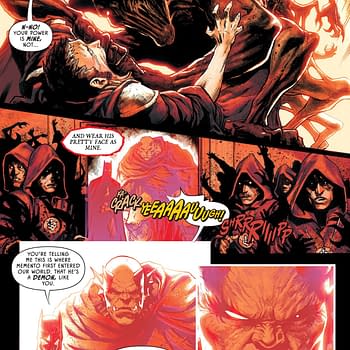Posted in: Comics | Tagged: america, Comics, entertainment, Romance Writers, Rosy Press
Rosy Press Vs Romance Writers Of America
Janelle Asselin, publisher of the Rosy Press digital romance comic imprint now publishing in print through Oni Press, wanted to attend the Romance Writers Of America yearly conference as an exhibitor, and getting involved with panels and workshops.
She was told,
I¹m not sure of the interest in romance comics. The authors who participate in the pitch sessions with editors are pitching romance novels of fictional narrative prose. I do know that some authors have allowed some of their previously published smaller books (say 40,000 words) to be produced as manga. Quite a few Harlequin romances have been reproduced as manga in the last few years. To be honest, I¹m not sure if you would find value in exhibiting.
Despite the rather ignorant and dismissive tone, Asselin pressed ahead, and was told to submit her company's creator contracts to insure against admitting "predatory publishers" into the event.
It is true that the romance publishing industry, possibly more than any other, has been preyed upon by so-called "vanity press" publishing deals which have left some new writers thousands of dollars out of pocket. And it's this kind of practice that the RWA want to insure against. Asselin did as she was asked and was told. And it was one of the RWA's definitions of predatory publishing that Rosy Press fell foul of. "This definition includes, but is not limited to, publishing programs that withhold or seek full or partial payment or reimbursement of publication or distribution costs before paying royalties."
In the agreement, Net Revenue is defined as the total amount of money generated from sales of the Magazine and Book minus any fees or costs directly associated with formatting, editing, printing, distributing, and storing the publication, including Talent's page rate and any attorney's fees Publisher may incur. This definition is in conflict with the final sentence (underlined) in our definition of Predatory Publishing. Specifically your company is withholding or seeking reimbursement for what we consider normal publication and distribution costs carried by the publisher, which should be deducted from the Publisher's portion, not the author's portion of earnings.
I am also concerned with the following sentence found in the License & Publication section: If Publisher does not extend the exclusivity period, the licenses become perpetual and non-exclusive. Could you explain what this means? Because the sentence in Other Legal Bits (After the exclusivity period this Agreement may only be terminated upon mutual agreement of the parties.) implies that if both parties do not agree then the contract cannot be terminated, or the author may not publish their work elsewhere.
Assellin replied, stating
I most definitely do not run a predatory publishing company – I'm a small press comic book publisher, and the bit of the contract that allows me to recoup costs is pretty standard in the comics industry.
In terms of the license and publication business, that refers to the fact that if I don't pay a creator to extend my right to exclusivity, they can then shop the work around elsewhere, although I can continue to sell the things I already had rights to. If that's a barrier to the creator getting it published elsewhere, we can come to a mutual agreement to terminate my rights to publish. This is all set up so that creators don't abuse the fact that I'm paying them to produce these comics and then turn around and sell the rights to a bigger publisher who will also pay them while not allowing me to sell the comics anymore.
She failed to get a response to her response until she posted this exchange and tweeted it out. At which point, they responded, saying,
Unfortunately I cannot add your company to RWA list of Trade Show exhibitors or RWA Qualifying Markets due to terms within your contract that fall within our definition of Predatory Publishing. Specifically your company is withholding or seeking reimbursement for what we consider normal publication and distribution costs carried by the publisher, which should be deducted from the Publisher's portion, not the author's portion of earnings. Sincerely,
There is certainly an element of snobbery here – with representatives seeing comics as an additional extra, a possible side project for lesser works to be adapted into, rather that a justifiable primary medium for romance writers.
But it is also true that (relatively) low sales of smaller press comic books have led to contracts that see the publisher paid first, rather than the creator. And the creator liable for certain costs up front. Most famously, Image Comics takes a flat fee for publication from the first dollar earned, and only when that fee has been satisfied, do the creators in question see a cent. And the issue about the transference of rights was one used by the likes of Gary Groth and Fantagraphics – and something that Dave Sim took issue with at the time.
While neither model is replicated by Rosy Press, there is an element of the contract that clearly sees costs born by the creator rather than the publisher. And the realisation that in prose publication, admittedly with fewer production costs when dealing with prose than with colour comic book artwork, the creators get paid from what is termed "dollar one" – the first revenue that comes in.
I think, in this case, it behoves the RWA to look again at the comic book industry and its acceptable practices. And also stop being such media snobs.
But it might also suggest that the comic book industry could do with looking at its own standards again. Romance, or not, there are many comic book creators who have found that, especially for creator-owned comics, that they never see a penny, even though thousands of copies of their comics are published and sold.
Indeed, in an attempt for comic book publishers to be more transparent regarding costs to their creators. The RWA would, it seems, be happier with a system where the creator is paid less, as the publisher takes more costs directly onto themselves.








